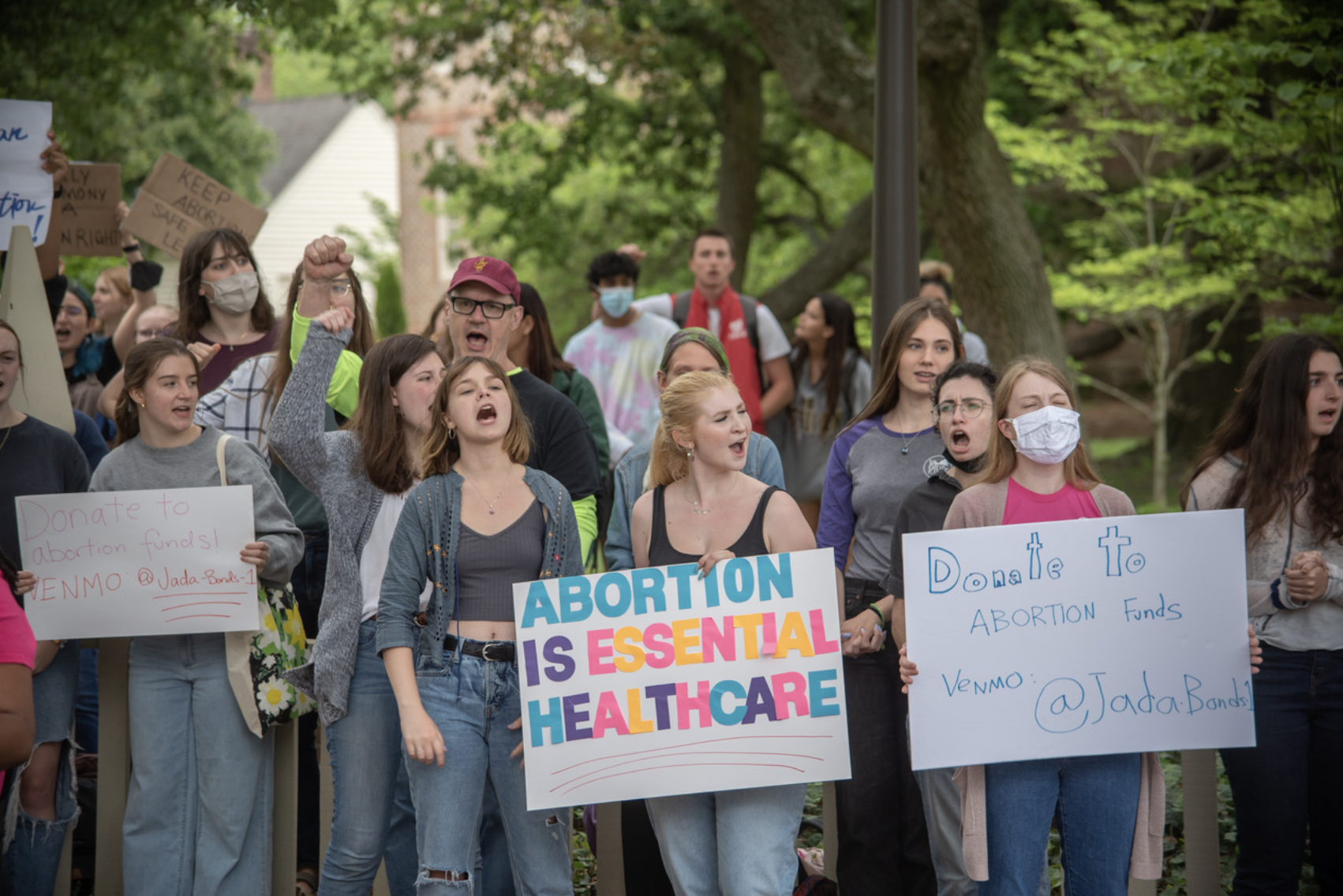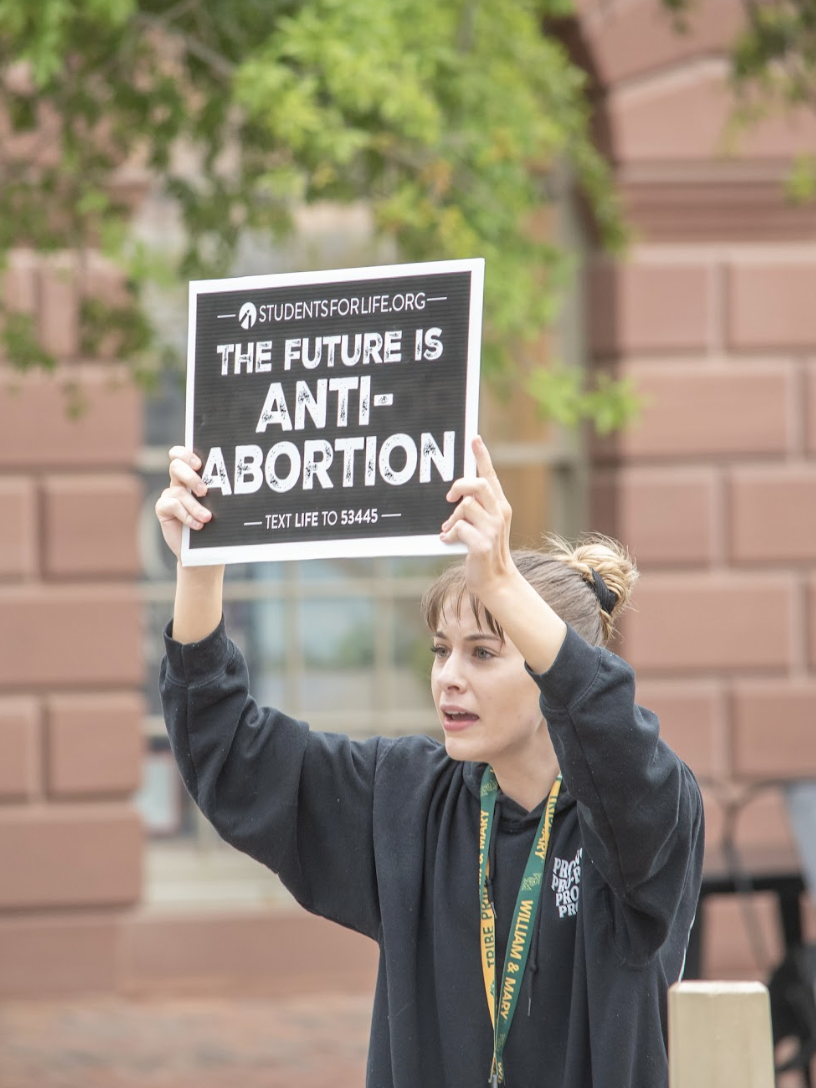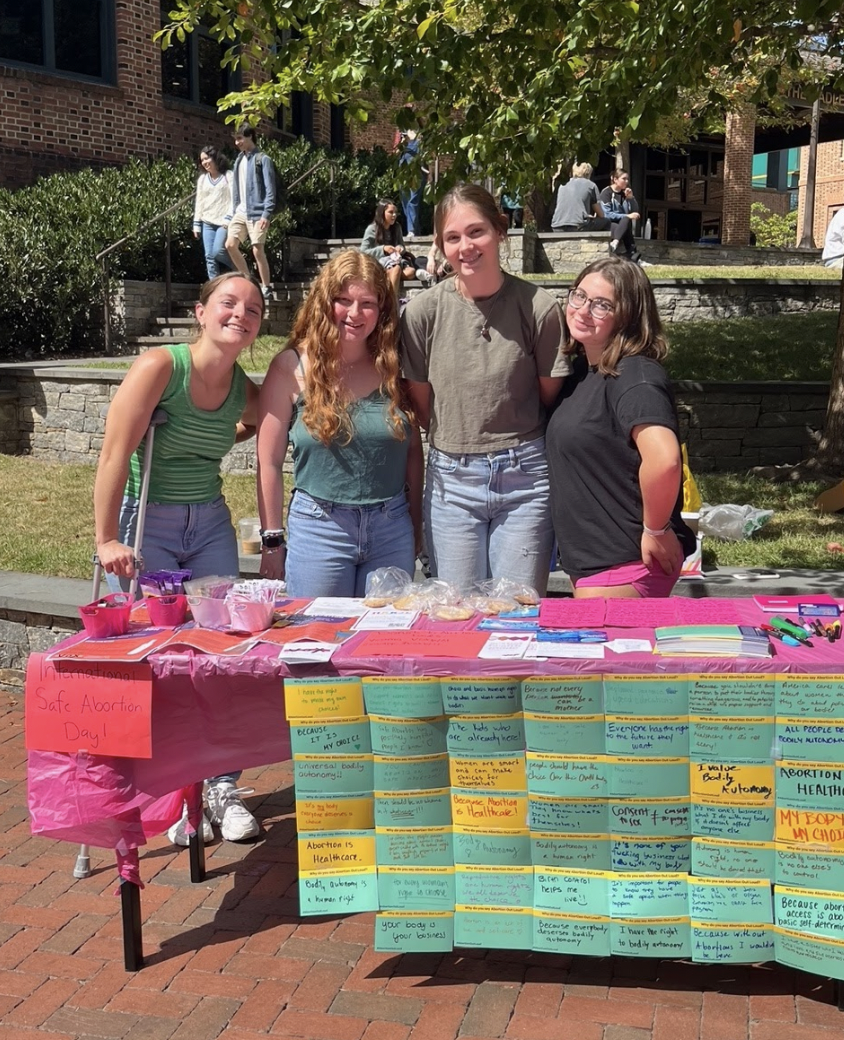The Abortion Debate at William & Mary
On June 24, 2022, the U.S. Supreme Court overturned Roe v. Wade, the 1973 case that guaranteed a constitutional right to abortion. The debate regarding abortion, however, is not a new one and has made its presence known on college campuses around the country. But how exactly does the debate function amongst students and faculty at the College of William and Mary?
Malise Foss ’24, the current Young Democrats Vice President, attended a debate between her organization, Young Independents, and College Republicans during her freshman year. As part of the discourse, the topic of abortion was set on the table to stimulate conversation.
“We had a debate, and it went very, very poorly,” Foss said. “Some of the College Republicans said some very not okay things, and then it was a whole big thing that happened. And I think since then, the Young Dems have been hesitant to do anything like that again because of how, kind of, spectacular, for lack of a better word, the last time was.”
With the overturn of Roe v. Wade on June 24, 2022, conversations and debates about the political, ethical, and medical aspects of abortion have increased exponentially worldwide. The day of the Supreme Court ruling, protests broke out in cities across the country. That same day, Planned Parenthood, a nonprofit pro-choice reproductive healthcare organization, issued a statement on Twitter stating, “we can’t, and we won’t back down now,” while nonprofit pro-life organization Live Action tweeted that the overturn was a “celebration” with “more work to be done.”
The debate surrounding abortion and women’s rights is not new at the College. Articles covering the topic of abortion at the College date at least as far back as 2006 on The Flat Hat’s website. In the past four years alone, campus demonstrations have included the Center for Bio-Ethical Reforms graphic anti-abortion protest in 2019 (an organization unaffiliated with the College), VOX: Planned Parenthood Generation Action’s counter-demonstration that same year, panels hosted by VOX in 2019 and 2020, Tribe for Life’s “Cemetery of the Innocent” this past September, and various speakers hosted by both VOX and TFL over the course of their duration on campus.
The conversation surrounding reproductive and abortion rights on the College’s campus continues today. How do leaders of organizations, students, and faculty members feel about campus discourse? And how does the College create a space for these conversations?
JUSTIN SHERLOCK // FLAT HAT MAGAZINE
Interest in abortion-related conversations has skyrocketed at the College, with Professor Chandos Brown recalling his efforts to introduce a history class on the topic in 1997. At the time, only one student enrolled in the course. His current seminar, “Abortion in America,” reached its maximum capacity almost instantly during registration for fall of 2022.
“I’m retiring the year after next, so I don’t know what kind of a future this course has,” Brown said. “But I get the impression that, insofar as the 16 in my seminar represent campus attitudes, there is a deep and passionate interest in this subject.”
JUSTIN SHERLOCK // FLAT HAT MAGAZINE
It is difficult to gauge the entirety of campus attitudes regarding abortion access; however, representatives from VOX, Young Democrats, as well as various professors on campus, voiced their belief in a majority pro-choice/pro-abortion student body.
“In our eyes, there is not much of a debate on campus, it is more separate groups expressing their own views,” the VOX Executive Board expressed in an email. “These groups often express these views in very public ways, which can force a ‘debate’ into the broader campus community. Especially with platforms like YikYak, which allows for complete anonymity, it can be easy for people to share their views without repercussions, and this can lead to intense, inflammatory conversations that are not based on any sort of evidence or facts; it’s just people hurling insults at each other.”
Both Professor Brown and Professor Claire McKinney discussed the lack of diverse beliefs expressed in their classes, with most students in support of the right to abortion. McKinney mentioned that many students interested in advocacy gravitate toward her classes while Brown noticed that though his class is geared toward the historical aspect of abortion, his students tend to gravitate more toward pro-abortion stances.
These conclusions, however, do not negate the fact that pro-life students have made their presence known on campus, with the TFL “Cemetery of the Innocent” in the Crim Dell Meadows and the organization’s tabling event on Sept. 12 with Students for Life.
JUSTIN SHERLOCK // FLAT HAT MAGAZINE
TFL President Skylar Culbertson ’23 transferred from Laurel Ridge Community College to the College during her junior year. She expressed her initial neutrality on the topic of abortion before discovering TFL and the debate on campus.
“I was kind of neutral about the whole abortion debate,” Culbertson said. “I didn’t really have any strong feelings about anything. I guess you could say I was personally pro-life — I thought I wouldn’t personally get an abortion, but I thought other people had that option. And then coming to campus, you know, I was exposed to the whole abortion issue, and I kind of had to pick a side, develop some feelings about it.”
Culbertson believes it is difficult to be pro-life at the College, recounting instances of harassment and vandalization, including a recent incident in which a liquid resembling urine was thrown at TFL members during a tabling event on Sadler Terrace. A statement from the William and Mary Police Department was issued after the incident.
“WMPD responded to a report of an individual throwing a liquid, thought to be urine, at students staffing the pro-life event on Sadler Terrace,” Chief of Police Deborah Cheesebro wrote in an email. “A W&M student was arrested on two misdemeanor counts of assault and battery in relation to this incident. William & Mary values freedom of expression and the respectful exchange of differing ideas; however, that exchange should not involve the violation of any laws or campus policies.”
Mila Stern ’25, a member of VOX, expressed issue with Culbertson’s complaints about TFL’s experiences as a pro-life group at the College.
“I do think that, at least on campus, a central part of their argument is not that they’re being silenced but that they’re standing up for people who are silenced, which is, again, not a fact, but it’s also not even consistent with certain religious ideologies that they might say it’s consistent with,” Stern said. “I do think that a central part of the narrative I’ve seen is that they like to play the victim.”
Stern emphasized that it is not in VOX’s best interest to interfere with TFL activities. “I do think that non-members have taken it upon themselves to interfere with actions that, off or on campus, pro-life advocates have done. And I don’t personally like to do this. I think it adds fuel to the fire and gives them a victim complex, which is, again, counterproductive and not what it’s about.”
Stern further explained her stance regarding pro-life activism.
“I won’t speak for everyone, but I see people on the other side as unable to see complex issues, maybe a little simple minded,” Stern said. “I’d also definitely sprinkle some sexism in there. Probably internalized sexism, not even necessarily they know it. But I would definitely say that there is a pretty big disconnect, and we don’t necessarily respect each other as individuals.”
The VOX Executive Board expressed that while they have a positive opinion of other political organizations on campus, they feel the campus debate should be more fact-based. They also expressed concern that many people do not understand the depth of the conversation surrounding abortion and that imagery used by other “abortion-based clubs,” a veiled reference to TFL, is harmful and fear-based.
“We would appreciate it if, instead of this method, they provided research-based evidence and overall utilized a much more empathetic, non-threatening approach,” the VOX Executive Board wrote in an email. “Along with this, we feel like other abortion-based clubs could expand their missions and platforms. Just like how we are not an ‘abortion club’ and actually focus on so much more, other clubs could find ways to express their views in ways that actually create positive community change.”
COURTESY IMAGE // SYKLAR CULBERTSON
Culbertson, however, argued that TFL is not a politically or religiously affiliated organization and that TFL is taking a stance on abortion solely from a human rights perspective.
“I think one of the biggest things is that this is not a religious issue, but it’s a human rights issue,” Culberston said. “Tribe for Life, you know, is a secular organization, and we have plenty of people in our club that are non-religious.”
In recent years, percentages of opposition and support have increasingly become more partisan, with The Pew Research Center publishing this past July that 84% of Democrats believe abortion should be legal in all or most cases, while only 38% of Republicans hold the same stance.
“Tribe for Life (TFL) is not a politically affiliated organization,” Culbertson wrote in an email. “Politics does not influence the way TFL advocates because violence against the preborn is a HUMAN RIGHTS issue.” (Emphasis Culbertson’s).
Though both VOX and TFL argue that many organizations on campus advocating for various sides of the abortion debate are not politically affiliated, this does not mean these organizations are entirely removed from politics themselves. On Oct. 19, TFL hosted politically conservative PragerU influencer Lily Kate to speak on “100 Reasons Why You Shouldn’t Be A Feminist.” Kate expresses her conservative views on Twitter, overtly denounces feminism, and condemns transgender individuals as “appropriating womanhood.”
Comments underneath the announcement for Kate’s speaking engagement on the TFL Instagram account also criticized the organization for inviting an individual whose right-wing ideologies about feminism and abortion were unrepresentative of some of TFL’s audience. Much of the discourse surrounded Kate’s affiliation with Turning Point USA (TPUSA), a conservative nonprofit organization with sister organizations dedicated to supporting former President Donald Trump and TPUSA Faith, which proclaims itself as “restoring America’s biblical values.” This past May, TFL also reposted a graphic from Live Action comparing abortion to victims of the Holocaust, an argument Live Action has made multiple times on its Instagram page.
COURTESY IMAGE // BECCA GAYLIN
In the past few semesters, VOX has not invited directly politically affiliated speakers to campus, with the exception of William & Mary Law School Professor Stacy Kern-Scheerer, who was running for city council at the time. Advertised speakers in the past year have included representatives from Hampton Roads Reproductive Justice League (HRRRJL) and intersex activist Marissa Adams.
When it comes to discussion, Professor McKinney has noticed some concerning trends in the classroom.
“I do find it troubling that anti-abortion students don’t try and engage me when what [we’re] trying to do is create spaces of learning and thinking and reflecting,” McKinney said. “My role is as an instructor and as a scholar. The fact that I am not engaged on these issues seems to be, to me, that we have limited the types of engagement that William & Mary as an intellectual community fosters.”
Brown emphasized the importance of students creating spaces to learn about the histories of the issues they are passionate about in order to become better informed and prepared for interacting with various arguments.
“I think that understanding the way that men and women deployed the cultural and intellectual resources available to them in dealing with historical problems — gender identity, race — enriches our sense of the possibilities in the present,” Brown said. “I understand that there is a very heated [relationship] between VOX and Tribe for Life. I’d like to think [my] students will be better prepared to inform.”
Brown stressed that his class is not designed to be a debate between students but to be about learning the historical basis of the abortion conversation in the United States and studying sources from a critical lens. However, Brown hopes that he is providing students with resources that will equip them with tools both for life and debate.
In terms of the College’s role in this conversation, Brown mentioned that spaces can be created on campuses for free interaction, discourse, and the exchange of ideas.
“Students of good faith will find a way to talk to one another,” Brown said. “Colleges are obligated to provide that space and to protect it. But you can’t compel students to like one another. You can’t compel them to agree with one another. You can’t even compel them to be nice to one another.”
McKinney expressed that a plurality of spaces need to exist for the on-campus conversation regarding abortion, especially in terms of how organizations interact with one another.
Many students, however, do not want to utilize those spaces or interact with groups on opposite ends of the debate.
“For people who are activists, I can understand that you don’t want to spend your time debating people who are not going to be convinced,” McKinney said. “And so I think there’s actually a really necessary space for people who want to move beyond debate and move to activity. But I think that, when that activism comes to influence spaces of deliberation and contestation and reflection, then we face real problems.”
She also discussed that the College’s environment can, through its nature as a relatively homogenous and insulated institution, exclude voices that are integral to the abortion conversation, including the people who are most directly impacted by abortion legislation and debates.
“I do think we need to move away a little bit from only thinking about people who are activists and thinking about . . . the stories ordinary people who are anti-abortion tell and why. Why are those the stories that work for them?” McKinney said. “Most of the people who have been enrolled [at the College] are not people who have faced issues of unintended pregnancies.”
She noted that when communities do not have spaces for reflection, it can be detrimental, especially for an issue like abortion.
“We don’t have the direct lived experience that could inform the issue in a different way,” McKinney said. “I think anytime we’re having a conversation where people who are the most directly affected are not part of the conversation, I think that should always give us pause.”
Brown said that he finds it difficult to understand spaces where women’s reproductive rights are up for debate, although he encourages historical discussion and free exchanges of ideas.
“I don’t want to live in a nation where women are slaves to their reproductive systems — I just don’t want to, that’s my final observation,” Brown said. “But the truth is I’ll die in this country, and that may well be the case.”
McKinney, whose work primarily focuses on abortion politics, mentioned the influence of morality within the abortion argument.
“In the United States, it’s become so much of a moralized politics,” McKinney said. “Either you’ve taken the correct moral stance on gender freedom, or you’ve taken the correct moral stance on fetal life. That’s the way that we kind of think about it. That shuts down a lot of space for conversation because you can easily box somebody as morally right or morally wrong.”
One of the most beneficial spaces on campus to facilitate conversations about abortion are in classroom settings, although oftentimes, many students are not willing to speak up.
“My hope is that we can have more productive discussions on campus, and that our relatively minor flare-ups of tactical disagreements doesn’t overshadow the fact that there are and there can be really important conversations,” McKinney said. “[I hope] that we remember that we’re dealing with people who have differing opinions; we still need to make community together, even though this is an incredibly important issue with incredibly high stakes. It’s a contradiction that’s really, really hard to navigate. But I appreciate all the people on campus who are trying to navigate it.”
JUSTIN SHERLOCK // FLAT HAT MAGAZINE






